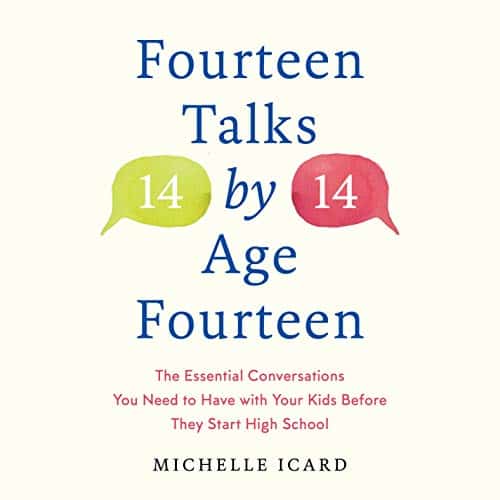
Teens are notorious for their lack of willingness to communicate (expect of course for 2 a.m. deep conversations). While the rise in technology use and a global pandemic has impacted all of our social skills, our teens have likely suffered the most. As parents, we want to set them up for success in life and may worry about the recent reports of “soft skills” deficits from employers and recruiters. Unfortunately, our efforts to practice communication skills (or simply communicate with those we love) are often rebuffed.
Don’t give up though, because we can get our teens to open up, by asking open-ended questions and finding the one thing they really want to talk about. Sometimes you just need the right questions to get get your teen talking.
25 Conversation Starters to Spark Meaningful Talks with Your Teenager
Talking to your teen isn’t always easy—we know. Here are some ideas that might end up leading to great conversations about their favorite memory, celebrity crush, or the most embarrassing thing that has happened to them at school—and maybe you didn’t even know about it! The point is, they’re opening up to you, maybe even just telling you something simple, like showing you their favorite app or telling you about their favorite band, but what they don’t know is that these conversations are probably the best part of your day.
Talk about society/culture
Asking general, but fun questions fosters natural conversation without putting your teen on the spot. It also without eliminates any pressure to have “the right” answer and helps you learn more about your teen’s interests.
1. What artist is most popular among people your age and why?
Remember what your parents said about your music as a teen? This is an easy area to “do better.” You may also discover some new artists to listen to yourself!
2. Can you recommend any good shows or movies on Netflix?
Besides learning more about your teen, this one also allow you to easily jump into pop culture conversations with younger co-workers at the office.
3. What’s a good board game to buy as a gift?
You may be surprised to learn your teen loves strategy games or maybe they are wordsmiths in hiding with a secret desire to be a poet or novelist. Maybe creating new worlds is their jam and you can learn their thoughts on a perfect community.
4. What social media platform is best (or most harmful)?
If it’s a platform you don’t use, ask more about it and why it is good or bad. Might you want to try it out yourself? You can learn their thoughts on technology use and get a better idea of how it impacts their own mental health.
5. What celebrity is the best role model?
This is a good way to slide into a conversation about values and how famous people can use their power for good or evil.
Related: Teens Hate These Five Questions, So Ask These Instead
Make it personal
Not all teens are open to talking about personal issues with their parents, but many are (you might be surprised if you try, and are willing to listen non-judgmentally). Remember that a conversation involves two people—if you are going to ask personal questions, be prepared to answer some yourself.
6. If you had to give a TedTalk, what would your topic be?
Our teens inhabit a world with us, but also separate from us. They know a lot more than we realize. Discovering their area of expertise can provide new avenues of conversation to pursue. (And they can teach us a thing or two as well!)
7. What does true friendship mean to you?
Sometimes our “friends” don’t really meet our definition of the word. But it’s not always easy to see this without thinking about what makes a good friend, or even a best friend. This of course goes the other way as well—you need to think about what it means to be a good friend to others.
8. If you could be an influencer, what would you promote?
You might get an eye roll at this one. Of course, parents are too old to comprehend the world of influencers. But if you can get them talking, this can be an interesting conversation about values, real life versus online life, or even social issues or economics.
9. What is your favorite holiday / vacation memory?
Again, cue the eye roll. But reminiscing is an easy topic that can snowball to feel-good stories about their childhood—and lots of laughter.
10. What makes you feel anxious / afraid?
Save this question for a time when you are willing to be vulnerable yourself. Our teens need to know that no one is strong all the time and that no one is perfect. Being able to verbalize these feelings of insecurity makes them easier to cope with.
Take the personal out of it
Sometimes talking about a “friend” is easier than talking about ourselves. Of course, most people see through these questions (or make assumptions even when you are asking for a friend).
11. What can I tell my friend whose teen won’t open up to her?
While you might not get the answer you want (or any help at all), this lets your teen know that you see there is a problem and want to make things better. If they don’t want to talk now, they might later.
12. Can you help me understand (gender issue of choice)?
Gender issues are often in the news. Many parents are confused and feel under attack simply for being ignorant of what is, to them, new terminology. Take a deep breath, and explain that this is all new and you aren’t passing judgment, you just don’t understand. You might get some attitude, but once they realize you are sincere, you will likely get a better understanding of how to support your teen and/or their friends and provide a safe space for them.
13. What qualities do you think are important in a romantic relationship?
Ideally, you would talk about this before they are in a romantic relationship, so it does not smack of you pushing into their personal lives. You might be surprised that they have already thought about the most important things in a healthy relationship, such as respect, trust, and communication.
14. What do you think about the report that Celebrity X is getting treatment for an eating disorder / addiction / mental health issue?
Talking about these serious issues in a public context not only normalizes the idea of seeking help, it can also lead to your teen opening up about their own concerns, whether about themselves or a friend.
15. Are most kids in school in relationships / taking a date to the dance?
Dating today is different from when we were in high school. Expecting your teen’s high school experience to be the same as yours can lead to complex emotions on your part and misunderstandings. Learning how teens view relationships will help you better understand your teen.
Related: My Son Stopped Talking During the Teen Years And It Was Tough on Me
Get philosophical
These lighthearted talking points are good one-on-one or in a group. Even better—the answers may change over time so you can revisit them over and over.
16. If you could travel to any point in time, what would it be?
This is always a fun conversation.
17. What is more important to have more of: time or money?
This is another opportunity to talk about values.
18. What is the best / worst thing about being a teenager? What do you look forward to (or not) about becoming an adult?
You may learn more about being a teen today and get a sense of what worries they have for their future.
19. What do you think planet will look like in 25 years? (And share any surprises you have witnessed.)
Another fun game of “what if.” And you may learn you have a budding innovator or entrepreneur.
20. How would you improve the education system?
They will likely have plenty to say on this topic. You might even hear a story you didn’t know about a favorite teacher (or least-favorite teacher).
Flip the Script
While these questions take more courage, asking about how our teen perceives your words and actions can help clear up miscommunications. Only ask these questions when you really want the answer and are willing to actually listen.
21. If you were to give me a report card on parenting, what would my grade be?
Parenting is a strange job: there is no guide book, no annual reviews, no raises. And, in a sense, you are in charge of your employer. Most of us are harder on ourselves than our kids would ever be. But it might be helpful to learn what we can work to do better.
22. What phrase do I use too much?
Some people use the same phrase so much it becomes their signature (even when they don’t realize it). Knowing yours can lead you to try to remove it from your vocabulary or embrace it as a calling card.
23. What do you wish I talked to you about more?
Parents aren’t perfect either. But it’s never too late to give our teens the information they want and need. This may be warnings about alcohol or drugs, the dreaded “sex talk” or information about skeletons in our family trees.
24. Have I embarrassed you / hurt your feelings?
Get ready, the answer is probably yes. But knowing this allows you to work on repairing your relationship and avoiding a repeat of the scenario.
25. If you made me a playlist, what would be on it?
See number 1.
For more tips and resources on talking to your teens and tweens, we recommend Fourteen Talks by Age Fourteen: The Essential Conversations You Need to Have with Your Kids Before They Start High School by Michelle Icard.

Parenting teens and tweens is a tough job, but you’re not alone. Here are some posts that other parents have found helpful:
This Is Why Teen Girls Are So Mean to Their Mothers
50+ Awesome and Inspirational Quotes for Teenagers
10 Common Problems Middle School Girls Face (And How Parents Can Help)
*This post may contain affiliate links where we earn a small commission for purchases made from our site.






db2upe